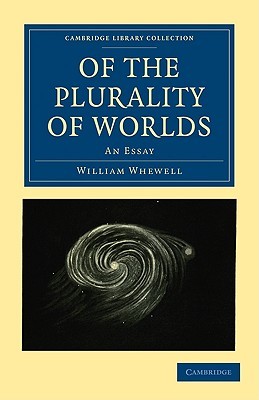
- We will send in 10–14 business days.
- Author: William Whewell
- Publisher: Cambridge University Press
- ISBN-10: 1108000185
- ISBN-13: 9781108000185
- Format: 14 x 21.1 x 2.3 cm, minkšti viršeliai
- Language: English
- SAVE -10% with code: EXTRA
Reviews
Description
This controversial essay, first published in 1853, addresses the question of the existence of intelligent life on other planets. It was first published anonymously, owing to the ferocity of the ongoing debates between the religious and scientific scholarly communities. Its author, William Whewell (1794-1866) was a leading intellectual of the Victorian period, and a notable polymath. A contemporary and adviser of Herschel, Darwin and Faraday, he wrote extensively on subjects ranging from astronomy and mineralogy to moral philosophy, educational reform and architecture, and engaged with John Stuart Mill in a lively debate about inductive reasoning. In Of The Plurality of Worlds, Whewell denied the probability of life elsewhere in the universe, afraid that the concept of extraterrestrial life would encourage the theory of evolution and put at risk mankind's connection to God.
EXTRA 10 % discount with code: EXTRA
The promotion ends in 22d.09:11:34
The discount code is valid when purchasing from 10 €. Discounts do not stack.
- Author: William Whewell
- Publisher: Cambridge University Press
- ISBN-10: 1108000185
- ISBN-13: 9781108000185
- Format: 14 x 21.1 x 2.3 cm, minkšti viršeliai
- Language: English English
This controversial essay, first published in 1853, addresses the question of the existence of intelligent life on other planets. It was first published anonymously, owing to the ferocity of the ongoing debates between the religious and scientific scholarly communities. Its author, William Whewell (1794-1866) was a leading intellectual of the Victorian period, and a notable polymath. A contemporary and adviser of Herschel, Darwin and Faraday, he wrote extensively on subjects ranging from astronomy and mineralogy to moral philosophy, educational reform and architecture, and engaged with John Stuart Mill in a lively debate about inductive reasoning. In Of The Plurality of Worlds, Whewell denied the probability of life elsewhere in the universe, afraid that the concept of extraterrestrial life would encourage the theory of evolution and put at risk mankind's connection to God.


Reviews